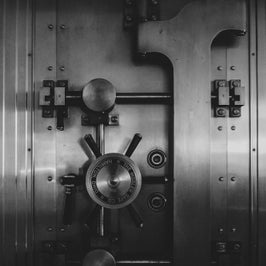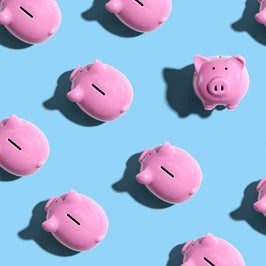What is a High Yield Savings Account?

High-yield savings accounts are deposit accounts that offer a higher interest rate than a traditional savings account. These accounts can be a great way to stash money for short-term savings goals and emergency expenses.
Here's what to know about how high-yield savings accounts work, their benefits, how to open one and what to look for as you compare your options.
What is a high-yield savings account?
A high-yield savings account is a savings account that offers an annual percentage yield (APY) that's much higher than the national average.
In December 2022, for instance, the average national deposit rate for savings accounts is 0.24%, according to the Federal Deposit Insurance Corporation. In contrast, there are several banks and credit unions offering APYs upwards of 3.00% or even 4.00%.
Some traditional banks and credit unions offer high-yield savings accounts, but they're more common among online banks that don't have the overhead costs associated with brick-and-mortar branches.
How do high-yield savings accounts work?
The terms for high-yield savings accounts can vary depending on the financial institution offering them. Here are some features you may come across as you shop around and compare available options.
Balance requirements
Some banks and credit unions may require a minimum deposit when you open the account, while others don't.
Additionally, many high-yield savings accounts don't have minimum balance requirements, but some may have a minimum balance required to earn interest on your deposits.
Interest rates
High-yield savings account APYs are variable, which means they fluctuate over time. The rates financial institutions offer are loosely related to the Federal Reserve's federal funds rate, which is the rate at which banks charge each other to borrow or lend excess reserves on an overnight basis to meet reserve requirements.
When the Federal Reserve hikes its interest rate to combat inflation, financial institutions typically follow suit by increasing their high-yield savings APYs. The same is true when the Federal Reserve lowers its target rate.
APY tiers
With some financial institutions, the APY you earn may be based on your balance. For example, you may only earn the advertised rate on $10,000, and any deposits on top of that threshold will earn a lower rate.
Alternatively, you may need to have a certain amount of cash in your savings account to earn interest at all.
Access to funds
Depending on the financial institution, you may or may not have easy access to the funds in your savings account.
If you also have a checking account with the bank or credit union, for instance, you may be able to make instant transfers between your accounts or be able to access your savings via an ATM withdrawal.
However, some institutions don't offer other banking services or ATM cards, so your only option is to transfer the money to an external bank account.
Also, keep in mind that while the Federal Reserve has amended Regulation D to allow consumers to take unlimited withdrawals from their savings accounts, some banks and credit unions still impose a six-withdrawal limit, and they may charge a fee for excess withdrawals.
Fees
Most high-yield savings accounts don't charge a monthly service charge.
4 benefits of using a high-yield savings account
There are many reasons to consider using a high-yield savings account for your emergency fund or some of your short-term savings goals. Here are just a few.
Higher interest rates
Compared to traditional savings accounts and even money market accounts, you can earn a much higher APY. It may not make a huge difference on a small balance, but as your savings grow, so will your earned interest.
Of course, interest rates will fluctuate over time, and high-yield savings accounts aren't always as attractive as they are during periods of high inflation.
Safe from market volatility
While high-yield savings account APYs can't compete with stock market returns, you don't have to worry about losing money in one. If you're saving up for a down payment on a home, a vacation or some other short-term goal, you don't have to worry about short-term market volatility impacting your objective.
At the same time, this safe return is a good reason for consumers to avoid high-yield savings accounts for long-term goals because the APY generally isn't high enough to outpace inflation, let alone provide a significant long-term return.
Funds are liquid
While accessing your money can take up to a few days with some financial institutions, you don't have to sell off investments and incur taxes to get the funds you need. And while some certificates of deposit may offer a higher interest rate, your bank or credit union will typically impose a penalty if you withdraw your money before the account's term is up.
So, if you have cash that you anticipate needing in the near term, a high-yield savings account is a great place to put it.
Low cost
Most high-yield savings accounts have little or no fees. Even if an account charges certain fees, they're usually easy to avoid. So, even if you don't use your savings account for a time or you don't have a lot of money to sock away, you generally don't need to worry about costly charges.
How to open a high-yield savings account
The application process can vary by financial institution, but opening an account usually only takes a few minutes. Before you open a high-yield savings account, though, take some time to research and compare interest rates, fees and other features for several high-yield accounts to ensure you're getting the best deal available.
You may also consider other financial products the bank or credit union offers. If you like to keep all of your banking under one roof, for instance, it might not make sense to open a savings account with a bank that doesn't offer checking accounts.
Once you find the right high-yield savings account for you, you can typically submit an application online through the financial institution's website. You'll typically provide the following information:
-
Full name
-
Social Security number
-
Date of birth
-
Address
-
Contact information
You'll likely also need to provide a copy of a government-issued photo ID, such as a driver's license, state ID or passport. Once you've submitted everything, you should receive a response relatively quickly.
When you're ready to fund the account, review your funding options, which may include cash deposits, check deposits, transfers from another bank account or wire transfers.
High-yield savings account vs. savings account
For the most part, high-yield savings accounts work the same as traditional savings accounts. The main difference is that high-yield accounts offer much higher APYs on deposits.
Also, while most banks and credit unions offer traditional savings accounts, most high-yield options are offered by online banks, meaning you may need to switch your banking to a different financial institution or keep your checking and savings at separate institutions.
High-yield savings account interest rates
Interest rates for high-yield savings accounts can fluctuate over time, but it's currently common to see financial institutions offering APYs ranging from 2.00% to upwards of 3.00% or even 4.00%.
Keep in mind, though, that just because a bank or credit union currently offers the best rate on the market, that doesn't mean it always will. So, if your top priority is to maximize your interest earnings, you may end up switching banks regularly, which can make your finances more complicated.
4 things to look for in a high-yield savings account
As previously mentioned, it's a good idea to research and compare multiple options before submitting an application. As you shop around, here are five features to keep in mind:
1. APY
While there's no guarantee that a financial institution will always offer the best APY out there, some tend to consistently offer higher rates than others. You'll also want to check for balance requirements or limitations that could impact how much you earn.
2. Fees
While most high-yield savings accounts don't charge many fees, it's still a good idea to keep an eye out for potential costs that could affect you.
3. Access
If you're using a high-yield savings account for emergency purposes, getting an account that only allows access to your funds via transfers to external accounts might not be a good fit. But if you're fine with waiting a few days to move your money, this feature might not be as much of a priority.
4. Other products
If you're satisfied with a standalone savings account, it might not matter if the financial institution also offers a checking account. But if you want a simpler approach to banking, you may only consider banks and credit unions that offer a wide range of banking products and services.
The most important thing is to take your time to think about your personal finance situation, your goals and your preferences, then choose the account that's best suited for you.
This article has been distributed for educational purposes only and should not be considered as investment advice or a recommendation of any particular security, strategy, or product. The information presented represents the current environment as of the date of publication and is subject to change without notice.








